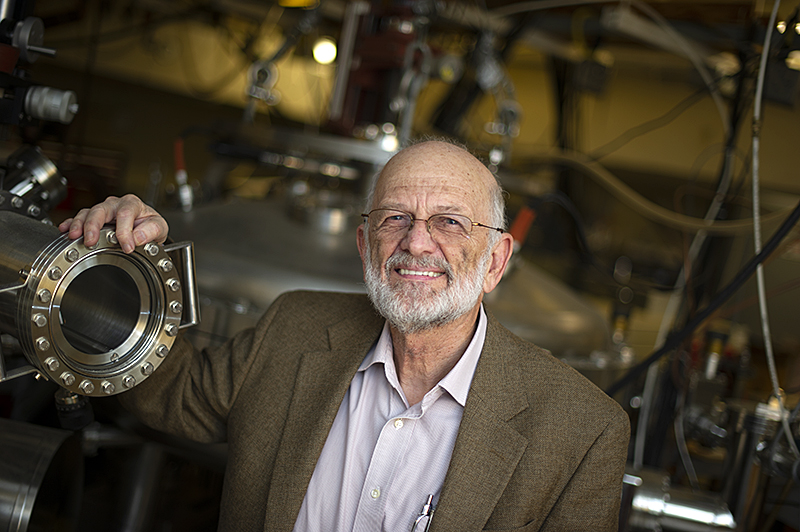地球初期化学の鍵を発見、創薬のための化学合成のスピードアップにつながる可能性も Chemists discover key to early Earth chemistry, which could unlock ways to speed up chemical synthesis for drug discovery
2022-10-03 パデュー大学

Graham Cooks has studied the chemistry of water droplets for decades, discovering insights into cancer detection, drug discovery and early Earth chemistry. (Purdue University file photo/Andrew Hancock)
これは、原始的な分子である単純なアミノ酸が、純粋な水滴の中で、生命の構成要素であるペプチドを自発的に形成することを初めて証明した。
水を使った化学反応は、タンパク質につながるので、地球上の生命につながり、人類の最も衰弱した病気を治療する薬の迅速な開発につながる可能性がある。
水滴が大気と出会う辺縁部では、信じられないほど急速な反応が起こり、無生物であるアミノ酸が生命の構成要素に変化することがある。
水滴中の反応速度は、同じ化学物質がバルク溶液中で反応するのに比べて、100倍から100万倍も速い。
この反応速度によって触媒が不要となり、反応が加速され、地球初期の化学反応の場合、生命の進化を可能にした。
<関連情報>
- https://www.purdue.edu/newsroom/releases/2022/Q4/the-fountain-of-life-water-droplets-hold-the-secret-ingredient-for-building-life.html
- https://www.pnas.org/doi/full/10.1073/pnas.2212642119
水系マイクロドロップレットにより、遊離アミノ酸からユニークなペプチド異性体のアビオティック合成と鎖延長が可能 Aqueous microdroplets enable abiotic synthesis and chain extension of unique peptide isomers from free amino acids
Dylan T. Holden, Nicolás M. Morato and R. Graham Cooks
Proceedings of the National Academy of Sciences Published:October 3, 2022
DOI:https://doi.org/10.1073/pnas.2212642119
Significance
Enzymes are needed for protein synthesis in vivo because dehydration in water to give amide bonds is highly unfavorable. However, conditions that permit the abiotic production of peptides in aqueous environments are a prerequisite for accepted origin of life chemistry. Here, we report a unique reactivity of free amino acids at the air–water interface of micron-sized water droplets that leads to the formation of peptide isomers on the millisecond timescale. Akin to many plausible prebiotic chemical systems (e.g., sea spray), this reaction is performed under ambient conditions and does not require additional reagents, acid, catalysts, or radiation. These findings exemplify the uniqueness of interfacial physicochemical processes and add support to the potential role of confined-volume systems in abiogenesis.
Abstract
Amide bond formation, the essential condensation reaction underlying peptide synthesis, is hindered in aqueous systems by the thermodynamic constraints associated with dehydration. This represents a key difficulty for the widely held view that prebiotic chemical evolution leading to the formation of the first biomolecules occurred in an oceanic environment. Recent evidence for the acceleration of chemical reactions at droplet interfaces led us to explore aqueous amino acid droplet chemistry. We report the formation of dipeptide isomer ions from free glycine or L-alanine at the air–water interface of aqueous microdroplets emanating from a single spray source (with or without applied potential) during their flight toward the inlet of a mass spectrometer. The proposed isomeric dipeptide ion is an oxazolidinone that takes fully covalent and ion-neutral complex forms. This structure is consistent with observed fragmentation patterns and its conversion to authentic dipeptide ions upon gentle collisions and for its formation from authentic dipeptides at ultra-low concentrations. It also rationalizes the results of droplet fusion experiments that show that the dipeptide isomer facilitates additional amide bond formation events, yielding authentic tri- through hexapeptides. We propose that the interface of aqueous microdroplets serves as a drying surface that shifts the equilibrium between free amino acids in favor of dehydration via stabilization of the dipeptide isomers. These findings offer a possible solution to the water paradox of biopolymer synthesis in prebiotic chemistry.



